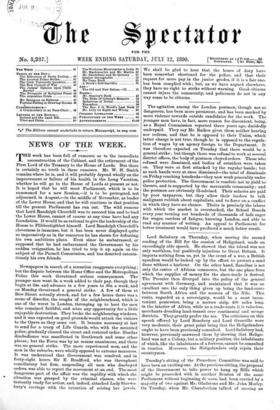Newspapers in search of a sensation exaggerate everything ; but
the dispute between the Home Office and the Metropolitan Police this week threatened serious consequences. The younger men want 3s. a week added to their pay, though they begin at 24s. and advance in a few years to 30s. a week, and on Monday threatened a general strike. A few of them at Bow Street actually struck, and for a few hours there was a scene of disorder, the roughs of the neighbourhood, which is one of the worst in London, thronging up to hoot the men who remained faithful, and seize any opportunity for a little enjoyable destruction. They broke the neighbouring windows, and it was expected on good grounds would attack the visitors to the Opera as they came out. It became necessary at last to send for a troop of Life Guards, who, with the mounted police, gradually cleared the street and restored order. Similar disobedience was manifested in Southwark and some other places ; but the Force was by no means unanimous, and there was no general strike. The more experienced men, and the men in the suburbs, were wholly opposed to extreme measures. It was understood that Government was resolved, and in forty-eight hours Sir E. Bradford, who was throughout conciliatory but firm, suspending all men who disobeyed orders, was able to report the movement at an end. The most dangerous part of the affair was the rapidity with which the situation was grasped by the criminal classes, who were instantly ready for action, and, indeed, attacked Lady Shrews- bury's carriage with the intention of seizing her jewels. We shall be glad to hear that the hours of duty have been somewhat shortened for the police, and that their request for more pay in the junior grades, if it is a fair one, has been complied with ; but, as we have argued elsewhere, they have no right to strike without warning. Good citizens cannot injure the community, and policemen do not in any way cease to be citizens.


































